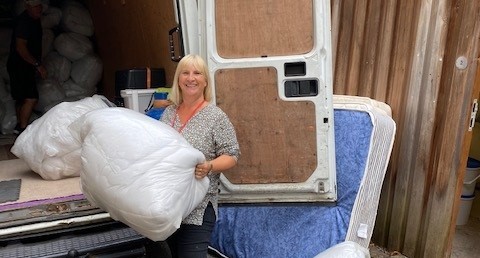Over 1000 recycled pillows and duvets donated to people in need across Ukraine and Exeter

In collaboration with OHOB and Turntable, the University of Exeter has recycled and donated over 1000 duvets and pillows to children and adults in need across both Ukraine and Exeter, preventing the items being sent to landfill.
The University of Exeter has partnered with OHOB, a humanitarian charity based in the South West consisting of a group of volunteers providing essential support to those in need, whether this is because of conflict, socio-economic status, circumstance or homelessness. Over 800 duvets and pillows have been donated to babies and children at orphanages across Ukraine from the University.
In May, the University delivered £890,000 worth of life-saving medical aid to Ukraine in partnership with experts from World Extreme Medicine. The first convoy successfully delivered its cargo of urgently needed medical supplies directly into Ukraine in early April, including tourniquets, air way management kits, paramedic bags and bespoke trauma kits for improvised field hospitals. A second delivery was made in May.
In addition to the donation to Ukraine, over 200 duvets and pillows have been donated by the University to several charities and organisations to support those in need across Exeter, thanks to a new partnership with Turntable, an Exeter-based charitable organisation that collects donated furniture, electrical items, and housewares, that are in a good, clean condition, to pass on to families and individuals on very low incomes.
Sabra Gardner, Assistant Contracts and Residents Experience Manager at the University of Exeter said: “All the bedding that was potentially earmarked for landfill has been recycled and donated to fantastic charities to help people in need across the globe and in the South West region.”
“We are hopeful that we can collaborate with Turntable and Exeter City Council for future donations and create a hub where used bedding and other much needed items can be recycled and distributed to various charities to prevent more waste from being sent to landfill. This is part of our plan to reduce waste and achieve our carbon net zero target by 2030.”
After declaring an environment and climate emergency in 2019, the University set out a plan to reach net zero before 2050, however, based on support and input from students and staff, this was accelerated to 2030 in March this year.
All aspects of Exeter’s environment and climate action are included in the University’s new Strategy 2030.
To find out more about the mission to reach net zero by 2030, visit https://www.exeter.ac.uk/about/sustainability/ or email climatemergency@exeter.ac.uk



